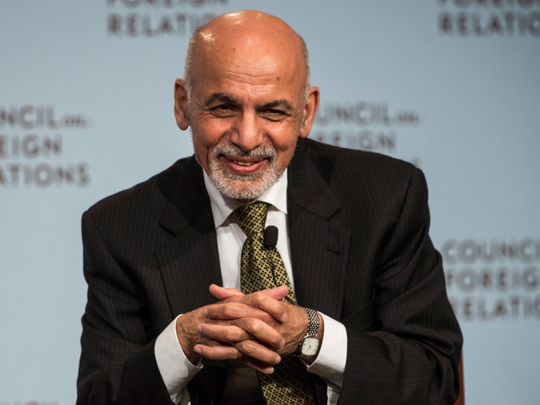
Afghan President Ashraf Gani’s recent high profile visit to the US, along with his Chief Executive Dr Abdullah, seems to have opened a new chapter in bilateral relations as mentioned by President Barack Obama in a joint press conference with his Afghan counterpart. To ensure a clear break from the past, Gani seems to have taken some bold steps to restore confidence and remove any misgivings resulting from the past several years of former president Hamid Karzai’s tenure in office. Gani was quick enough to sign the long-awaited Bilateral Security Agreement with the US on the second day in office. Gani was generous in paying high tributes to the US government and American people for the sacrifices and support to Afghanistan during the past decade after the overthrow of the Taliban.
In sharp contrast to Karzai, Gani, with the diplomatic skills he has mastered, was able to convince his partners in Washington that Afghanistan still mattered. After spending years at the World Bank and his long-standing engagement with the international community, Gani speaks an effective language that resonates very well with US policy makers. As a first breakthrough, Obama agreed to Gani’s demand to slow down the troops’ drawdown. Thus, US troops level will remain at around 10,000 during 2015 and will not be reduced to around 5,000 as originally planned. This means, it is more likely that US troops will remain even after Obama’s stint in office. Regarding Afghan government’s stance on the US troops overstay beyond 2016, this scribe participated in a Gulf News debate about a month ago. Another good sign is that Obama has requested $1.5 billion (Dh5.5 billion) for development assistance for Afghanistan for 2016.
Post–Taliban Afghanistan is strongly characterised by an overarching role of the US in building the country’s civil and military establishments. It is a well-known fact that without a stabilising involvement of the US, Afghanistan might revert back to an unstable political and security environment providing a potential breeding ground for the terrorists. Gani was very straightforward in conveying this message to the US officials loud and clear. Yet, Afghan government must be mindful of the fact that the ultimate goal shall have to be self-reliance in all sectors. Fortunately, a recurring theme during Gani’s visit was the necessity for Afghanistan to put its own house in order.
No doubt, Afghanistan has enormous potential for economic growth due to its vast natural resources. Yet, without stable political environment and strong state institutions, the country will not be able to utilise its natural wealth for its national development goals. Eradicating corruption had been the top slogan for both Gani and Abdullah during their election campaigns. It is now time to materialise the election promises by taking serious measures to fight corruption. It is noteworthy also that tackling corruption has been one of the long-standing demands of the international community and one of the pre-conditions for continuing aid to the war-torn country. Immediately upon taking power, Gani re-opened the Kabul Bank scandal and the culprits are being brought to justice. Yet, there is a lot more to do to fight corruption as it has become systemic requiring more decisive and fundamental measures to address the menace.
Gani also appreciates the importance of peace-building in order for his ambitious development agenda to succeed. From day one, he is focused on the peace initiative. He has already made some serious efforts to engage Pakistan and China to help facilitate the peace process. The US is apparently happy with the pro-activeness and must be carefully watching how it actually plays out. Early signs suggest Pakistan’s positive opinion of Gani as someone they can work with unlike his predecessor Karzai who had adopted more of a belligerent approach. Yet, it is more of cautious optimism than real progress at least for now.
Gani’s impressive speech to Congress has been well received internationally as well as back home. It might be the first time during the past decade of Afghan-US engagement that the US efforts for Afghanistan have been dully acknowledged in the strongest possible words. From a US soldier in battlefield to high ranking officials working on Afghan security and development, Gani has expressed a deep sense of gratitude on behalf of Afghans, appreciations that have been long overdue. Gani’s speech provided a detailed account of his vision for the country as well as the nature of relationship with the US he would like to shape in the years ahead. Gani led the successful transition of security from International Security Assistance Forces (Isaf) led by US to Afghan National Security Forces (ANSF). The process provided him an opportunity to get a deep insight into all aspects of military as well as civilian administration along with inherent challenges and opportunities. Gani was an ideal figure to lead the transition process with the credibility he enjoyed nationally as well as internationally.
Gani’s historic trip to the US and a remarkable welcome accorded to him indicates the US looks at him as an ideal partner to work with. Yet, one cannot ignore the challenges that lie ahead of the national unity government, a political framework brokered by the US. Both Gani and Abdullah have a historic responsibility to fulfil their national and international obligations by harmonising their efforts for the common objective of bringing stability to Afghanistan and be a catalyst for the regional stability. A stabilising engagement by the US will ensure Afghanistan’s success in Gani’s ‘decade of transformation’.
Ajmal Shams is President of the Afghanistan Social Democratic Party better known as Afghan Millat National Progressive Party and is based in Kabul, Afghanistan. He served as Policy Advisor to President Ashraf Gani when he chaired the security transition commission.










